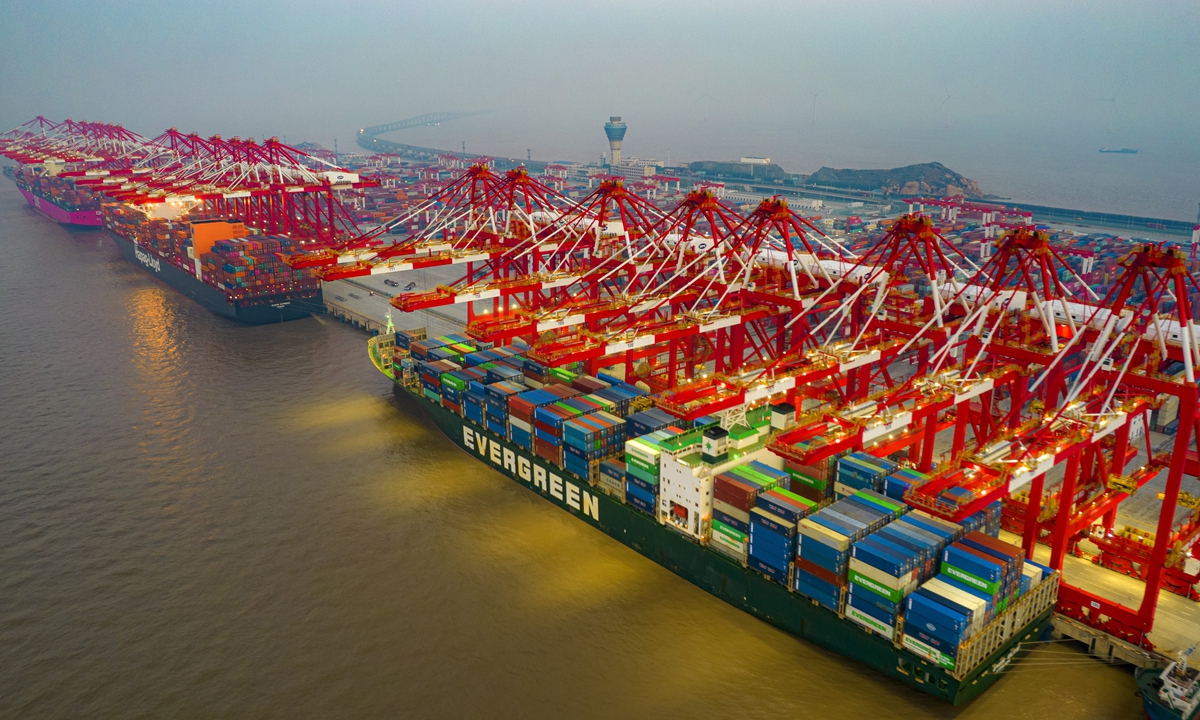
Container vessels berth at the Port of Yangshan to clear cargo around the clock in Shanghai on January 2, 2022. Photo: VCG
An official from the Chinese Ministry of Transport on Tuesday highlighted various world-leading indicators for the nation's shipping industry, ahead of a major forum on global cooperation in the shipping industry that is set to kick off in Shanghai later this month.
The Shanghai Municipal Government held a press conference on Tuesday to introduce the 2023 North Bund Forum and the development of China's shipping industry. After years of development, China now has the world's largest shipping industry.
China ranks first in key indicators for the industry, including ship-owning, port cargo throughput, port container throughput, inland waterway freight volume and inland waterway navigation mileage, said senior official Gao Haiyun, while introducing the development of China's shipping industry.
Measured by gross tonnage, China has been the world's largest ship-owning country since mid-August, surpassing Greece. It tops global port cargo throughput and container throughput, and it has the largest inland waterway freight volume and inland waterway navigation mileage.
China has established cargo freight links with more than 100 countries and regions, covering all coastal countries and regions along the 21st Century Maritime Silk Road.
As the country's most important method of freight transportation, maritime shipment now carries about 95 percent of China's foreign trade, Gao said.
China has eight of the world's 10 largest container throughput ports, and seven out of 10 in terms of total port throughput. In 2022, the nation had a port cargo throughput of 15.685 billion tons, and container throughput of 296 million twenty-foot equivalent units (TEUs).
China's inland waterways are also well developed. The mainline of the Yangtze River has been the world's busiest inland waterway for many years. In 2022, China's inland waterway transport saw a total freight volume of 4.402 billion tons, and cargo turnover of 1.9 trillion ton-kilometers.
In the first half of 2023, investment in water way transportation construction reached 93.6 billion yuan ($12.8 billion), a year-on-year increase of 26.7 percent. The high level of fixed asset investment contributed to stable growth and expanding domestic demand.
The Chinese government is encouraging multimodal transport to boost infrastructure and logistics. On March 15, China's ministries jointly issued a multimodal transport plan for the next three years. It has quickly paid off, with 4.778 million TEUs of containerized rail-water multimodal traffic completed in the first half of 2023, up 9.4 percent year-on-year.
As the venue for the North Bund Forum, Shanghai is a city famous for its developed shipping industry. As one of China's most important ports, Shanghai has ranked first in the world in container throughput for 13 consecutive years. The port also plays an important role in cargo freight data processing and derivative industries. On August 18, China's first shipping futures product, the Containerized Freight Index (Europe Service) Futures Contract, was listed for trading on the Shanghai International Energy Exchange, said Wang Weiren, a senior official of the Shanghai Municipal People's Government.
The North Bund Forum will be held from September 22 to September 24 at the Grand Halls in Shanghai, with the theme of "Openness, Cooperation and Innovation: Co-building a New Landscape of Global Shipping & Aviation." The forum will reveal more than 20 innovation achievements and cases, demonstrating all parties' progress in promoting the shipping industry over the past year.
